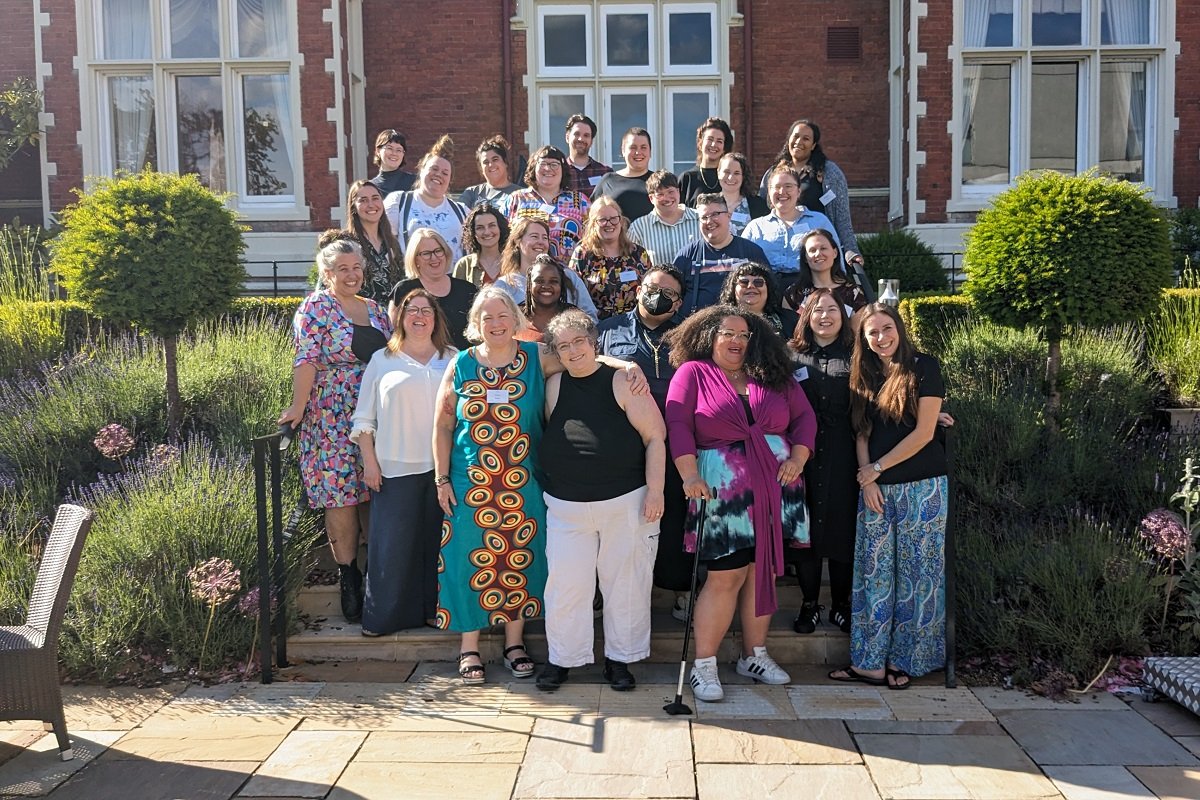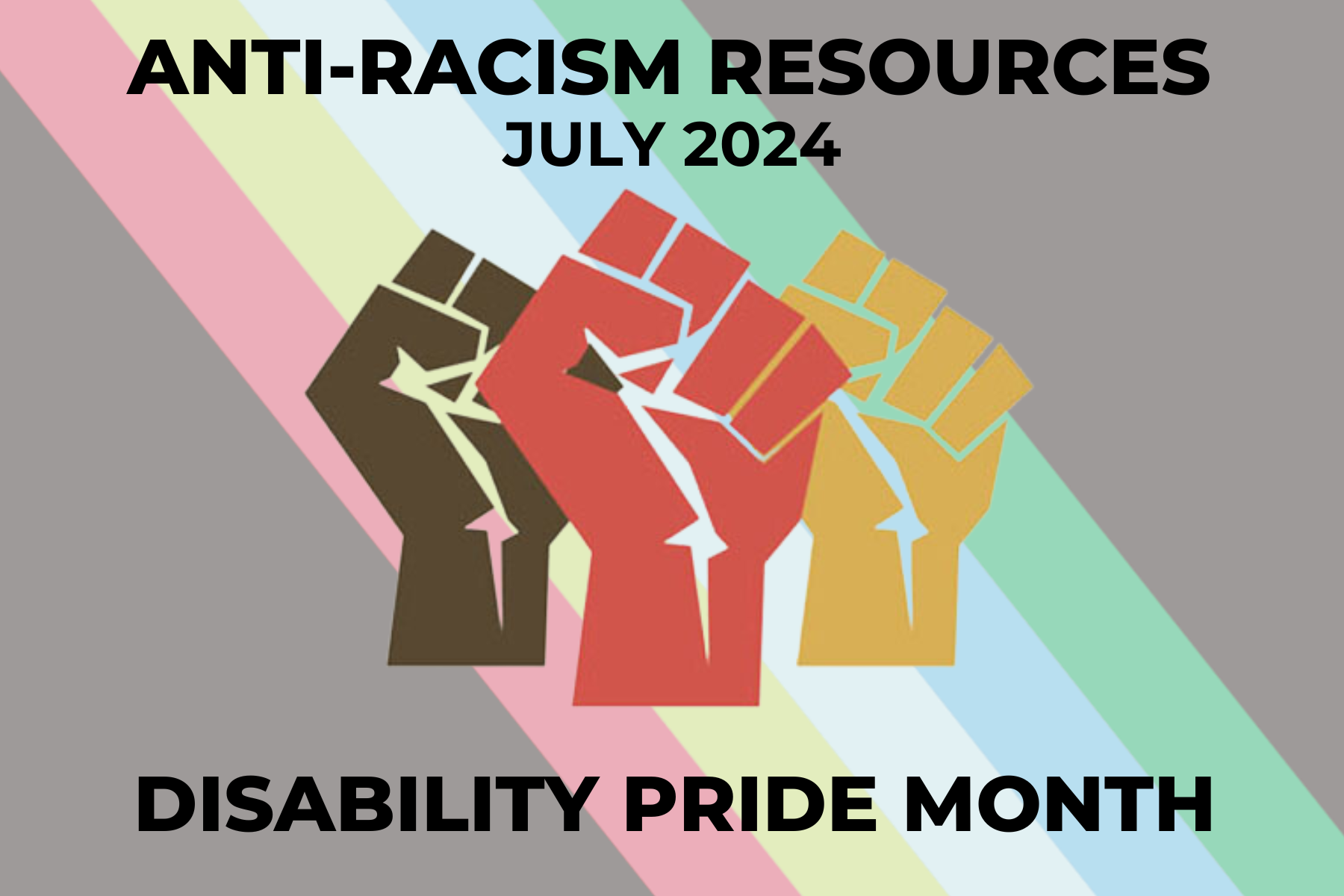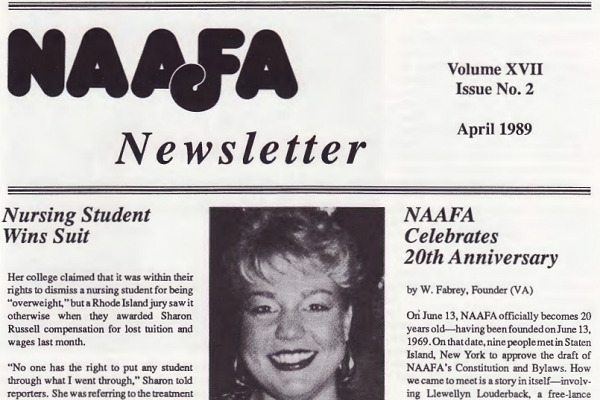Traveling Fat and Disabled
Traveling Fat and Disabled
By Tigress Osborn, NAAFA’s Executive Director
These days, it’s not unusual for my friends to start conversations with one question: “Where are you?” There’s been a lot of travel for me over the last few years, first as the NAAFA Board Chair and now as the Executive Director. I’ve traveled to educate people about fat liberation and to promote fat rights and the Campaign for Size Freedom. I’ve met with other non-profit leaders, sought new funding, supported local fat community events, and presented at conferences. I’ve documented the stories of size acceptance and fat liberation movement elders, and I’ve spent time with some of the activists, scholars, and influencers who will be the next generation of fat community leaders.
It’s an honor and a privilege to get to represent NAAFA this way, all over the country and sometimes abroad, too.
The timing of all of this NAAFA-related travel has coincided with me becoming a mobility aid user, including canes, a rollator, and wheelchairs as needed. Traveling fat and disabled has highlighted the ways in which every aspect of transit and transportation can be inaccessible and often impossible for larger-bodied people of any ability level and for disabled people of any size. The challenges of traveling in this body are eased somewhat by the knowledge I’ve gained through the fat, disabled, and fat and disabled folks who came before me. I’m lucky that community support and other people’s willingness to share resources and experience have helped me navigate planes, trains, and automobiles, plus stations and other locations that are neither fat-friendly nor accessible for disabled people. I’ve figured out many hacks and work-arounds, often with the help of some of you reading this newsletter. Others’ advocacy and example, whether personal or part of organized movements, is part of the reason I can travel for NAAFA today.
NAAFA has a long history of pushing for fat travel accessibility, including a protest at LAX airport that was one of the many individual and community actions that led to Southwest Airlines’ Customer of Size Policy. Younger folks or those newer to fat activism may not know or remember that fat people used to refer to the airline as “Southworst” because their open seating policy often created even more hostility for fat air travelers than other airlines assigned seating did. Today Southwest is known as the airline with the best policy anywhere in the world for people who need more than one seat for air travel, but even Southwest planes are not always socially safe spaces for fat travelers, and one airline with a better-than-everyone-else policy does not equate a world in which fat travelers have the same rights and resources as everyone else.
Today at NAAFA, as we advocate for fat rights legislation through the Campaign for Size Freedom, we also continue to advocate in other ways for accessible transit options. We consult with transportation professionals, speak out in the media about fat travelers’ needs, and work to influence government and corporate policies related to accessible travel. We create programming and resources that can help educate and empower larger folks with examples of best practices for traveling safely and comfortably as fat or superfat people. We inspire folks by featuring fat-friendly traveler planners and fat adventurers who conquer global travel without waiting to lose weight to set off on their adventures.
Whenever I am asked, by individuals or by the media, to speak on the subject of moving through the world in a fat body, I include discussion of other types of access and accommodations alongside our size advocacy. Anything that (finally) fits fat bodies but is still inaccessible in other ways won’t work for me, because my disability needs to be accommodated, too, and because it’s my job– and the job of all fat liberationists– to work to include disability rights and disability justice in our intersectional fat activism. NAAFA’s focus is on fatness, but as we expand our resources and our influence, we are committed to expanding our work towards accessibility for all.
THE ADDITIONAL COSTS OF INACCESSIBLE TRAVEL
In addition to the physical and social challenges that fat people might encounter when out in the world, transit and travel can also cost more for bigger people. “Fat tax” is a term that refers to the extra money that larger people have to spend in comparison to our thinner counterparts just to get goods and services that are appropriate for our bodies. Whether using day-to-day transportation or the systems we encounter when traveling longer distances for work or play, the fat tax might show up in these places:
Purchasing a second seat for air, bus, or train travel
Renting larger cars or upgrading to larger rideshare options
Buying seat belt extenders for planes and cars (most airlines provide seat belt extenders at no charge, but some customers prefer to use their own rather than having to ask for one)
Booking hotel accommodations that are safe and comfortable for bigger folks (limited accessible rooms mean fat and/or disabled people are sometime forced to stay at more expensive hotels due to fewer options)
Paying additional baggage fees
Spending additional time researching or making arrangements (some travel arrangements have cost NAAFA team members hours of extra time due to ineffective systems, confusing policies, and lack of training related to size-accessible possibilities)
Spending additional time following-up on mishaps such as misassigned second seats, damaged mobility devices, or disrespectful interactions with staff
Adding disability to the above means also dealing with a disability tax that works the same way, though the specifics vary depending on a person’s disabilities. Even when accessibility support is free and available (such as wheelchair service in airports), it can be hard to utilize and still costs money because tipping is customary and important. Sometimes additional help may need to be arranged or hired. Sometimes more expensive, privately hired, ground transportation has to be used instead of public transit because public options are inappropriate, inefficient, or in some places, non-existent for disabled people. Airlines are notorious for damaging mobility devices (extended size devices, or customized devices for people of any size, can be especially difficult and expensive to replace). The list goes on.
NAAFA is committed to ensuring that our fat and disabled staff and volunteers get the support they need while traveling. When others are covering the costs, such as when we are invited speakers or paid consultants, we work with organizations to make sure their policies and procedures support accessibility for fat and disabled people in an ongoing way, not just for the duration of the time they’re working with NAAFA. When NAAFA is covering the cost, we set aside the appropriate funding to ensure that accessibility needs are met.
We are thankful to the donors who share these values and who support us spending what we need to spend to make sure our team can travel accessibly. If you’d like to contribute to this support, you can make a one-time gift to NAAFA today or become a member of the NAAFA POD, our group of Passionate Ongoing Donors who give monthly.







